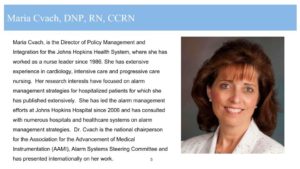Maria Cvach, DNP, RN, FAAN, who is director of policy management and integration for Johns Hopkins Health System, recently spoke with the Physician-Patient Alliance for Health & Safety (PPAHS) about the experience of John Hopkins Hospital in improving patient safety and reducing alarm fatigue.
Clinical Education Podcast Features Maria Cvach on Reducing Alarm Fatigue
In a clinical education podcast that was released on PPAHS’s YouTube Channel, Ms. Cvach discussed how John Hopkins Hospital was ahead of the curve in managing alarm fatigue, which became The Joint Commission proclaimed as a national patient safety goal in 2014. Johns Hopkins Hospital had formed an alarm management committee in 2006:
So, the reason why we got into it at Hopkins Hospital was actually because we have what are called CUSP units (comprehensive unit safety program), where we ask the bedside units, “how will your next patient be injured?” and one of our units identified that they were really concerned about the amount of noise that just serves to distract people and isn’t necessarily helping with safety. And, so, that is actually how we got started with this and when we started digging, you know it was like peeling the layers of an onion, once you start digging you’re going to find all kinds of things. What we found is that we had so many alarms, many of which weren’t really actionable, but they were just serving to distract and were a potential for missed alarms and making errors. And, so, I think that that’s probably your biggest problem is your alarm should be about directing your attention from something that’s less important to something that’s more important. And when your alarm is not doing that, then you have the potential to distract staff from things that they’re working on that are more important. Your taking their attention away from that. And that’s where things can get missed or mistakes can be made and so that’s why we felt this was an important thing to manage.
Clinical Education Podcast Features Maria Cvach on Reducing #AlarmFatigue Click To Tweet
Insights into Reducing Alarm Fatigue
In the clinical education podcast, Ms. Cvach provides fascinating insights, including:
- How building layout needs to taken into account to improve alarm management – “When you build these new buildings, they have very spacious floor plans. You don’t have a single nursing unit anymore … so you can’t think like in the old days where you had your patients all centered around a nursing station and you could hear everything .. and so we really had to think outside of the box before those buildings went up on how we were going to ensure primary notification and and then secondary notification …”
- Silencing alarms may be a symptom of a larger issue – “I have to say that there are times when it may be appropriate to turn off or silence an alarm, but considerable thought needs to go into that decision. It should be done with caution, it should not be done routinely and as a way to just alleviate the noise on a unit. You don’t want to just do it routinely. It should be done cautiously. It should be done after discussion with others. It could be that you’re discussing it with another charge nurse on the unit or with a physician on the unit. If the clinicians are routinely doing this, that’s a sign that there is a problem with their alarm management strategy.”
- Develop notification algorithms to improve responses to alarms and proper notification – “Just a couple of things to mention is algorithms. It is important when you’re using middleware to develop algorithms and those algorithms need to be developed at the level of the alarm. So, for instance, you can have an algorithm for a ventilator alarm in which it goes to the respiratory therapist first, then it goes to the nurse, then it goes to the secondary nurse, and then it goes to the charge nurse.”
To hear more advice from Ms. Cvach, including 6 steps to standardize good alarm management, please click here.
Featured in the podcast with Ms. Cvach are:
- Leah Baron, MD (Chief of the Department of Anesthesiology, Virtua Memorial Hospital); and
- Marc Schlesinger (Senior Associate, ECRI Institute’s Applied Solutions Group).
The clinical education podcast was made possible by an unrestricted educational grant from Bernoulli Health.
